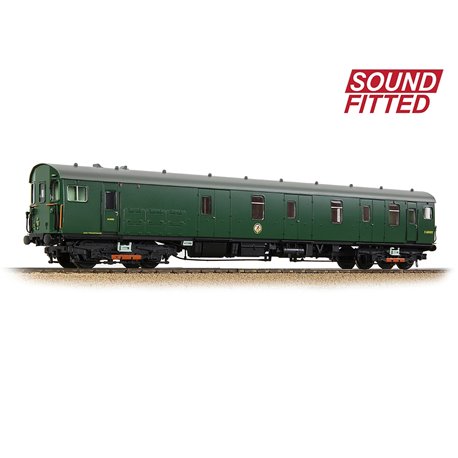No products
Valid to UK only - excludes oversized items
Product successfully added to your shopping cart
There are 0 items in your cart. There is 1 item in your cart.
Valid to UK only - excludes oversized items
Easter shipping
Please note that couriers are not collecting on Friday 18th and Monday 21st April.
Orders will be dispatched on Tuesday 22nd April
Class 419 MLV S68002 BR (SR) Green
31-265ASF
Bachmann
This product is out of stock
| Scale | OO (1/76) |
More info
Class 419 MLV S68002 BR (SR) Green
The Motor Luggage Van (MLV) will be a welcome addition to the Branchline range, joining models like the Class 410 4BEP and the Class 411 4CEP which make the perfect running partners and allow prototypical trains to be created. The Branchline model combines a finely detailed bodyshell with a chassis that sports a plethora of separate components – representing the various equipment fitted to the underframe of the vehicles, along with excellent reproductions of the bogies. Although comprising just a single vehicle, the powerful five pole motor and flywheel will provide plenty of traction if you ever need your model to haul additional stock. Supplied complete with SOUND FITTED, you can enjoy the added dimension of realistic sound effects when operated on analogue control or DCC straight out of the box!
MODEL FEATURES:
- Bachmann Branchline OO Scale
- Era 5
- Pristine BR (SR) Green livery
- Running No. S68002
- Accessory Pack
- NEM Coupling Pockets
- Powerful 5 Pole Motor with Flywheel
- Directional Lighting
- SOUND FITTED - Fitted with a ESU Loksound V5DDC Sound Decoder – See below for the function list
- Length 270mm
SOUNDS
F0 - Directional Lights - On/Off
F1 - Sound - On/Off
F2* - Brake
F3** - Air Horn (High)
F4*** - Air Horn (Various)
F5 - Heavy Engine
F6 - Southern Region Whistle
F7 - 3rd Rail Arcing
F8**** - Coupling
F9 - Flange Squeal
F10 - On - Guard's Whistle / Off - Driver's Response
F11 - Buffering Up
F12 - On - Driver's Single Buzzer / Off - Guard’s Response
F13 - On - Driver's Double Buzzer / Off - Guard’s Response
F14 - On - Cab Door Opening / Off - Cab Door Closing
F15 - Luggage Loading/Unloading
F16 - AWS Horn
F17 - Air Tank Drain Down
F18 - Fade All Sounds
F19 - Mute (Latch) / Volume Cycles 6 Levels (Trigger)
F20 - Compressor
F21***** - Rail Clank
F22 - Spirax Valve
F23 - Windscreen Wipers
F24 - Handbrake
F25 - Station Announcement
F26 - Brake Set/Release
* Alterative Brake sounds can be selected via CV changes
**/***Alternative Horn characteristics can be selected via CV changes
**** Alternative Coupling sounds can be selected via CV changes
***** Alternative Rail Clank sound can be selected via CV change
Analogue Users: Please note that normal load running sounds and any other automatic or randomised sounds will also operate when this model is used on analogue control (DC) straight from the box!
CLASS 419 MLV HISTORY
Ten single car Motor Luggage Vans (MLV) were built between 1959 and 1961 to provide additional luggage carrying capacity for boat trains operating on the newly electrified Kent Coast line from London to ports on the South Coast which connected with cross-channel ferries. They were designed to be fully compatible with units that operated services on the stretch of the South Eastern network between London and the Kent ports, principally 4CEP and 4BEP units (later Class 411 and 410 respectively).
Each MLV was also fitted with two sets of batteries which were charged by a motor generator during operation on the third rail electrified lines - this enabled the vehicles to work independently and away from electrified routes which was particularly useful upon reaching the ferry ports in the south. The MLV would be detached from the train and could then traverse the dockyard to enable direct loading of luggage onto the ship, with the vehicle added back onto the London end of the train for the return journey.
Originally numbered S68001-S68010, with the implementation of TOPS (Total Operating Processing System) the MLVs were designated Class 419 with numbers in the series 419001 – 419010. When renumbered, the units retained their original numbers on the bodysides (albeit without the ‘S’ prefix) and the last four digits of the new TOPS number were applied to the unit ends.
As boat traffic reduced, the vehicles saw increased use on other services, particularly carrying parcels and mail, or in departmental use where they served as tractors units on electrified lines. Their use on mail traffic saw two examples (Nos. 419001 and 419004) receive Royal Mail livery, however this livery made the units obvious targets for thieves and No. 419004 was the subject of a robbery in March 1989 whilst working a Brighton to London Bridge service. Withdrawals commenced in 1994 and all had been retired by 2004, although remarkably only two examples were lost – the other eight having been preserved.






